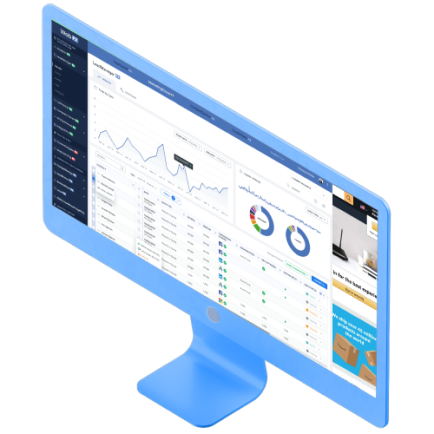Marketing Data Management: How to Leverage Your Data
What does marketing data management entail and how do you put it into practice? Keep reading for a complete explanation and tools you can use to manage your marketing data!
Or, if you’d like to jump straight to learning about a robust data management solution for your company, check out our proprietary software, MarketingCloudFX!
What is marketing data management?
Marketing data management is the process of collecting, organizing, analyzing, and applying data to your business strategies. It involves taking a systematic approach to your data and using the appropriate tools to achieve business results.
If you’ve ever wondered how to better understand the data analytics information you receive from various platforms, marketing data management is the solution.
Why is marketing data management necessary?
With advances in technology creating a more digitized space for interacting with your customers, you receive ample data. However, none of that data means anything if you can’t organize, understand, and apply it to your business decisions.
When you employ a robust marketing data management strategy and activate your data, you allow yourself to take advantage of the many benefits data brings to your business, including:
Understanding your target customer
Dividing your overall market into actionable customer segments and personas requires data. After all, how else would you determine which segmentation characteristics make the most sense for your audience?
You need a comprehensive understanding of your audience to know the similarities and differences between them and how those comparisons will affect your marketing strategy.
Once you’ve created your personas, data allows you to dig deep into who they are and their pain points. This data will help you craft a targeted and effective marketing strategy for each customer segment.
Personalizing your messages to the individual
Take your targeting a step beyond personas, and craft personalized messages based on one person’s history with your company. What have they purchased? What pages did they visit on your website?
For example, Spotify creates playlists for each user based on their listening history.

Collecting data, unifying it under one umbrella, and leveraging AI-powered marketing technology (martech) empowers you to automate personalization on a granular level.
This level of personalization plays a critical role in helping you capture your audience’s attention and delighting them.
Evaluating marketing campaigns
Which campaigns performed well? Which marketing channels drove the best results?
Understanding the answers to these questions requires complex analysis. Instead of only looking at vanity metrics or sales numbers, examine more concrete data to gain an accurate view of your campaigns’ performance.
For example, consider two marketing channels: paid search and social media ads.
Your paid search ads might look less successful because they didn’t drive as much baseline revenue as the social media ads. But your return on investment (ROI) for paid search was higher because it cost less.
With marketing data management, you can see these patterns to make informed decisions instead of basing your insights on partial information.
You can also break down your channels according to goals like customer acquisition and customer retention.
Which platforms or campaign strategies work better for each? What value do you gain from each new and returning customer? Your data management helps provide answers to those questions.
Optimizing your marketing campaigns
When you understand the impact your marketing campaigns have on your bottom line, you can also make real-time adjustments to leverage more results from each.
Take the paid search campaign from the example above. In our hypothetical scenario, this campaign carries a high ROI but a lower baseline revenue than other channels. With your data unified and organized, you might see patterns that provide insights to optimize this campaign for even better results.
You could A/B test multiple changes and leverage real-time data to see how your new implementations affect the results on various levels. Do the changes help you reach a target segment more effectively? Do they increase conversions or retention?
Use your findings to make the most effective changes to your campaigns!
Nurturing your leads through the sales funnel
The above benefits all feed into lead nurturing. If you understand your target segments, personalize your interactions with them, and optimize your marketing campaigns, you can also nurture leads more efficiently through the sales funnel.
A robust data management strategy will help you understand your audience on an aggregate and individual level.
You’ll use past data to see which pieces of content and channels work best for each sales funnel stage and each audience segment. Then, apply these findings to future leads. Continual optimization driven by data will help you make your lead nurturing process more efficient.
Attributing ROI
When a campaign generates results, you need to attribute them to the correct channels. Accurate attribution and ROI calculation help you communicate the value of various marketing channels to secure future budgets.
Moreover, data-driven marketing leads to 15-20% higher ROI, making it a must-have tactic for maximizing your profits.
Marketing data management best practices
Marketing data management begins with the right approach. To make the most of your data, you’ll need to follow marketing data management best practices like:
Integrating your data
If you’re a digital marketer, you likely have plenty of data from many sources at your disposal. However, that data means little when it lives in isolation. For the most significant effect on your business, you need to integrate your data from across platforms and analyze it together.
For example, you could use a data pipeline to move your data from one location to another. But, what is a data pipeline, exactly? A data pipeline is a sequence of data processing actions that automatically moves data from one or more sources to a target destination. By using one, you can move your data into once central location for easy access and analysis.
This integration allows you to spot patterns and contextualize the information you’re seeing. After all, none of your customers interact with you at just one touchpoint. The same buyer might:
- See a social media ad
- Search for your brand online
- Navigate through your website
- Subscribe to your email list
While your metrics from each platform provide some value, the real gold comes when you see how all those channels interact in your customers’ journeys.
Unifying and attributing your data
With all your data integrated, you might imagine a vast database full of disparate pieces of information and numbers that all reference different metrics. Organizing this massive database can prove challenging to say the least.
To make sense of it all, you need a way to organize your data that helps you see how each channel, campaign, and customer action connect.
You also need a system to attribute your data to your overarching marketing goals. To start, you’ll need to specify those goals. Then, consider the attribution model that will work best for your business.
As you unify your data, remember the journey your customer segments take to purchase — and post-purchase — and the platforms your brand uses. The proper organization and attribution approach will vary from company to company based on factors like these.
Securing your data
Any time you collect customer data, you must abide by laws and regulations for customer privacy and data security. Ensure you understand these standards and keep your data management system compliant.
Analyzing and applying your data
To gain anything from your data, you must analyze it. If you integrated and organized your data, you can easily analyze and apply your findings.
Once you’ve analyzed your data, you can use your insights to adjust and optimize your strategies or even create new strategies for the future. At this stage, you’ll leverage your data and see results manifest.
Communicating your data across teams
Marketing requires significant cross-company collaboration. Because data fuels all your business decisions, you need to communicate your findings with other teams, such as the sales and product development departments.
For efficient communication, you’ll need to distill your findings into actionable reports relevant to each team.
Marketing data management also means summarizing your data in ROI-centered reports for management. These reports will help your company’s leaders see your marketing campaigns’ impact on the bottom line.
Meet MarketingCloudFX:
One platform tracking countless metrics and driving stellar results.
Learn More About Our Proprietary Software

Marketing information management solutions
If you read those best practices and felt overwhelmed wondering how you could accomplish them all, you’re not alone.
Marketing information management is complex, and it becomes more challenging as your business grows. Fortunately, you have many software options to streamline your data management strategy.
While martech, like Google Analytics, collects and organizes disparate data, one of the biggest challenges of marketing data management is unifying that information.
With 44% of marketers using five or more martech tools, you can imagine how complex the integration process can become.
Your company might have a data analysis team who could achieve effective integration, but couldn’t they better spend their time analyzing that data so you can apply their findings to your strategies?
You can employ various technologies to automate the data integration and organization so your analysts can spend their time doing what they do best. Some data management solutions you might have heard of include:
- Data warehouses: Data warehouses are places for you to store and organize your data so you can analyze it. They form the back end of most other data management software packages.
- CRM software: CRM platforms collect and organize data about your existing customers. CRM software is a great data management solution for customer retention.
- Data management platforms (DMPs): Similarly, DMPs collect data for a specific purpose — ad targeting. With DMPs, you can form and understand customer segment profiles from anonymized customer data.
- Customer data platforms (CDPs): On the flip side, CDPs provide an in-depth look at your customer data. These platforms will pull first-party data from various sources to form individual customer profiles.
A robust marketing information management solution allows you to integrate data from different sources. The right software keeps your customer data secure while automating foundational processes so you can spend more time analyzing, applying, and communicating your findings.
The software to solve your marketing data management needs
These tech-driven solutions sound fantastic, but how do you find the right data management solution for your business’s needs? At WebFX, we’ve created a holistic software suite to manage and report on the data that matters most to your business.
MarketingCloudFX is a CDP that integrates data from various sources to provide real-time insights into your digital marketing campaigns and audience behavior. With MarketingCloudFX, you’ll see your data from multiple channels — online and offline — in one place.
As a CDP, the software creates customer profiles to inform your strategy. For example, MarketingCloudFX unifies your lead data to help you understand:
- How your leads came to you
- How they interacted with your business
- The journey they took to purchase
The platform also integrates data from call-tracking software and provides holistic insights into user behavior on your website. MarketingCloudFX even empowers you to personalize your site for different visitors.
Alongside MarketingCloudFX, we offer Nutshell,a platform that integrates with the rest of your data. Already have a CRM system? No problem! MarketingCloudFX also integrates with many popular platforms like Salesforce, Zoho, LionDesk, and more.
Measuring the metrics that affect your bottom line.
Are you interested in custom reporting that is specific to your unique business needs? Powered by MarketingCloudFX, WebFX creates custom reports based on the metrics that matter most to your company.
- Leads
- Transactions
- Calls
- Revenue


Take control of your marketing data with MarketingCloudFX
Your data powers your marketing strategy, so prioritize your data management approach. With MarketingCloudFX, you’ll streamline the integration and organization of your data so you have more time to gather meaningful insights and apply them to your strategy.
After all, as powerful as data is, you only see results if you have the chance to analyze your data in real-time.
Want to learn more about how MarketingCloudFX will optimize your marketing data management strategy? Call us at 888-601-5359 or contact us online to speak with a strategist today!
Related Resources
- Data-Driven Marketing: Everything You Need for Optimizing Your Strategy
- Digital Marketing ROI: How to Measure & Improve Internet Marketing Investment
- How to Use Psychographics for Data-Driven Marketing
- Marketing Data Examples: 6 Types of Marketing Data
- Marketing KPIS
- The Best Data Management Companies Worldwide
- What Are Data Brokers – and What is Your Data Worth? [Infographic]
- What Are Marketing KPIs?
- What is a Data Stack? + Benefits and Data Stack Tools
- What is Data Segmentation, and Why Do You Need It?
Marketing Tips for Niche Industries
- Manufacturer Marketing Strategies
- Manufacturing Marketing Agency
- Manufacturing Marketing ROI
- Manufacturing Marketing Statistics
- Marketing for Architects: 4 Architect Marketing Strategies to Use
- Marketing for Government Contractors: Top 4 Strategies
- Marketing for Software Companies: 3 Software Marketing Strategies to Use
- Marketing Ideas for HVAC Companies
- Marketing Strategy for Construction Companies: Your 5-Step How-To
- OB/GYN Marketing: Attract More Patients with Digital Marketing for OB/GYN Practices









